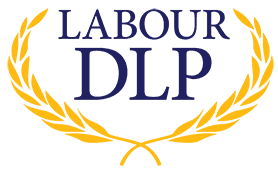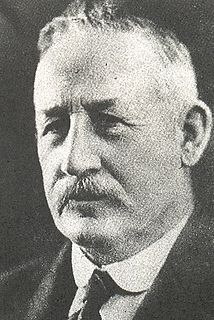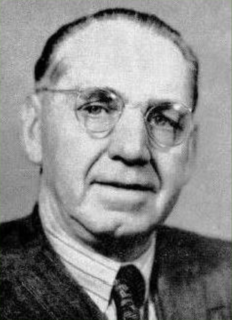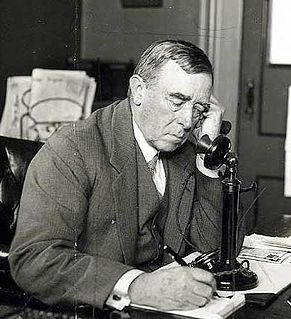
The Democratic Labour Party (DLP), formerly the Democratic Labor Party, is an Australian political party. It broke off from the Australian Labor Party (ALP) as a result of the 1955 ALP split, originally under the name Australian Labor Party (Anti-Communist), and was renamed the Democratic Labor Party in 1957. In 1962, the Queensland Labor Party, a breakaway party of the Queensland branch of the Australian Labor Party, became the Queensland branch of the DLP.

Liberalism in Australia dates back to the earliest pioneers of the area, and has maintained a strong foothold to this day. Liberalism in the country is primarily represented by the centre-right Liberal Party. The Liberal Party is a fusion of liberal and conservative forces and are affiliated with the conservative centre-right International Democrat Union. Philosophical liberals are often called a "small-l liberal" to distinguish them from members of the Liberal Party.
The Australian Fabians was established in 1947. The organisation aims to "contribute to progressive political thinking" as well as "progressive political culture".

The Australian Greens Victoria, commonly known as the Victorian Greens or just as The Greens, is the Victorian state member party of the Australian Greens, a green political party in Australia.

John Allan, Australian politician, was the 29th Premier of Victoria. He was born near Lancefield, where his father was a farmer of Scottish origin, and educated at state schools. He took up wheat and dairy farming at Wyuna and was director of a butter factory at Kyabram. In 1892 he married Annie Stewart, with whom he had six children.

Edmond John "Ned" Hogan was an Australian politician who was the 30th Premier of Victoria. He was born in Wallace, Victoria, where his Irish-born parents were small farmers. After attending a Roman Catholic primary school, he became a farm worker and then a timber worker, and spent some time on the goldfields of Western Australia.

William Gerrand Gibson was an Australian politician. He was the first member of the Country Party elected to federal parliament, serving in the House of Representatives and as a Senator for Victoria (1935–1947). He was the party's deputy leader from 1923 to 1929 and was a government minister in the Bruce–Page Government.
The Victorian Farmers' Union (VFU) was an association of farmers and primary producers formed in 1914 in the Australian state of Victoria. Although initially formed as an "absolutely non-political" entity, the VFU became a political party in 1916, and nominated candidates for the 1917 state election and subsequent elections. In later years it used the names Victorian Country Party, then United Country Party and is now the National Party of Australia – Victoria. At the 1917 election, because the support for the VFU was concentrated in rural seats, it won four of the 11 seats in the Victorian Legislative Assembly it contested, gaining about 6% of the vote state-wide. In 1918 it also won its first seat in the federal parliament, after preferential voting was introduced. At the 1920 state election the VFU vote increased to 8% and the number of seats to 13, giving the VFU the balance of power in the state Legislative Assembly.

Percy Gerald Stewart was an Australian politician. He was an original member of the Victorian Farmers' Union and long a radical campaigner for farming interests. He helped bring down Stanley Bruce's government in 1929, but died soon after.

Percy James Clarey was an Australian trade union leader and politician.

Carwarp is a locality in Victoria, Australia, approximately 36 km from Mildura, Victoria. Carwarp was the home town of Percy Stewart, a founding member of the Victorian Farmers Union, from which the Country Party emerged. Stewart served in both the Victorian Legislative Assembly, where he represented the electoral district of Mildura, and in the federal parliament for the Australian House of Representatives electorate of Wimmera. Another parliamentarian from Carwarp was Albert Allnutt, who represented the electoral district of Mildura in the Victorian Legislative Assembly from 1927 until 1945.
The Australian Labor Party split of 1955 was a split within the Australian Labor Party along ethnocultural lines and about the position towards communism. Key players in the split were the federal opposition leader H. V. "Doc" Evatt and B. A. Santamaria, the dominant force behind the "Catholic Social Studies Movement" or "the Movement".
The Liberal Country Party (LCP) was a splinter group of the United Country Party, the Victorian branch of the Australian Country Party, formed after federal MP John McEwen was expelled from the state branch for accepting a ministry in the Lyons-Page Coalition government in 1937. Following a tumultuous party conference in 1938, another federal MP, Thomas Paterson, led a hundred McEwen supporters to form the LCP, a faction of the party loyal to the federal party. The breach had been resolved by 1943.
William John McCann was an Australian politician, member of the Victorian Legislative Council.

The 1932 Victorian state election was held in the Australian state of Victoria on Saturday 14 May 1932 to elect 44 of the 65 members of the state's Legislative Assembly. The other 21 seats were uncontested.
The Voluntary Euthanasia Party was a minor political party in Australia, founded in early 2013 by Corey McCann to advocate for legislative change to allow voluntary euthanasia in Australia. The party's inception was strongly supported by Dr Philip Nitschke, director of Exit International and Richard Mills, then President of Dying with Dignity NSW.
Katherine Mary Isabel "Kath" Williams, néeChambers and formerly Clarey was an Australian trade unionist and campaigner for equal pay.

The National Party of Australia – Victoria is a political party in Victoria, which forms the state branch of the federal Nationals. Traditionally representing graziers, farmers and rural voters generally. The Victorian Farmer's Union formed in 1914 was the precursor to the Victorian Country Party, later the Nationals.
The Australian Labor Party , commonly known as Victorian Labor, is the semi-autonomous Victorian branch of the Australian Labor Party (ALP). The Victorian branch comprises two major wings: the parliamentary wing and the organisational wing. The parliamentary wing comprising all elected party members in the Legislative Assembly and Legislative Council, which when they meet collectively constitute the party caucus. The parliamentary leader is elected from and by the caucus, and party factions have a strong influence in the election of the leader. The leader's position is dependent on the continuing support of the caucus and the leader may be deposed by failing to win a vote of confidence of parliamentary members. By convention, the premier sits in the Legislative Assembly, and is the leader of the party controlling a majority in that house. The party leader also typically is a member of the Assembly, though this is not a strict party constitutional requirement.
The Liberal Party of Australia , branded as Liberal Victoria, and commonly known as the Victorian Liberals, is the state division of the Liberal Party of Australia in Victoria. It was formed in 1949 as the Liberal and Country Party (LCP), and simplified its name to the Liberal Party in 1965.










